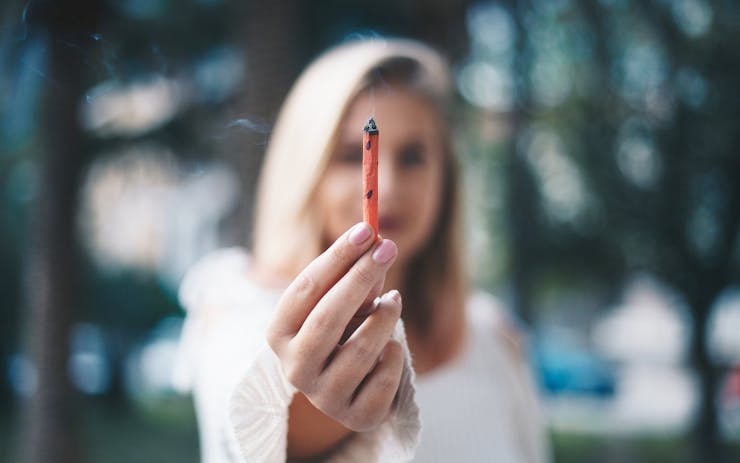Jessica Ginet works at Shadowbox Farms, one of Oregon’s largest adult-use cannabis cultivators, and grows medical cannabis on her own land. She lives, works, and writes in herbaceous southern Oregon. Jessica seeks to remove stereotypes and reveal a more accurate depiction of who consumes cannabis and why.
Leafly welcomes op-ed contributions from industry and political leaders on a range of topics related to cannabis.
Old-time cigarette ads bring to mind a different time and place, a Mad Men-style era when sexism was on display in everyday life and played a prevalent part in advertising. These gems from Tipalet Cigarettes are a case in point: “Give her your Tipalet and watch her smoke,” one says. Another: “Blow in her face and she’ll follow you anywhere.”
The old adage “sex sells” is alive and well in cannabis marketing.
Such misogynistic advertising might seem straight out of midcentury America, but when you compare it to present-day cannabis marketing efforts, it’s not clear that much has changed. Consider these recent examples put out by Advanced Nutrients:
- Trade show booths featuring nearly naked women wearing shirts with the tagline “Size Matters”
- A nonionic surfactant formula called Wet Betty advertised with a barely dressed woman and the phrase “Plant Penetrator”
Need more evidence? Stop by a smoke shop and survey the advertisements for rolling papers, blunt wraps, other accessories. You’re almost certain to find advertising for these products featuring sexualized photos of women.
The old adage “sex sells” is alive and well in cannabis marketing. These ads make it seem that there are only two demographics of cannabis consumer: Stereotypical stoner guys and 20-something women with big boobs, scant clothing, and an appetite to party.
The truth is that women play an important role in the industry and are a key customer demographic. A survey by Marijuana Business Daily found that about 25% of all cannabis businesses are founded by women and that women hold 26.9% of executive positions in the cannabis industry. On the consumer side, 7% of women in the US regularly consume cannabis, according to a 2016 Gallup poll, compared to 12% of men.
Any good cannabis company should have plenty of other things to brag about, whether it’s the quality of their product, a unique experience or health benefit, their grower’s pedigree, or the heritage of their strains. By instead falling back on misogynist portrayals of women, these businesses cheapen the entire industry. In the eyes of the mainstream consumer, they reduce thousands of promising products down to a single message focused on sex.
This imagery affirms preconceived notions of cannabis as a party drug.
Movements like #TimesUp and #MeToo have swept other industries, including politics and entertainment, initiating waves of change. Cannabis must make the same evolution. To do this, our industry must move beyond hypersexualized images of women and instead focus on the impact that women have as customers, entrepreneurs, wellness advocates, and industry leaders. It’s high time for integrity and thought in cannabis marketing.
On the political stage, states are continuing to legalize cannabis, and the emerging legal industry is seeking federal validation. Key to federal acceptance is improving the mainstream perception of cannabis, which is hampered by sexualized marketing that brings to mind the underground cannabis market. This imagery affirms preconceived notions of cannabis as a party drug used by those who flout the law.
Marketing plays a key role in how the wider public perceives the industry, and cannabis is much more than how it is currently advertised. Let’s promote cannabis products with accurate descriptions of their features and benefits rather than sexualized images of one-dimensional women.
Our industry has the opportunity to be progressive and go beyond clichés by doing away with images of women posing provocatively with bags of bud. Let’s promote cannabis as a plant for the people—the sick, the elderly, the healthy—and a miracle plant that is carefully cultivated, lovingly cured, and appreciatively consumed.





